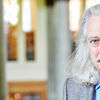
Professor Derek B. Scott
- Position: Emeritus Professor of Music
- Areas of expertise: Music, cultural History, and ideology; cosmopolitanism and music in the metropolis (especially in London, New York, Paris, and Vienna); operetta and musical theatre.
- Email: D.Scott@leeds.ac.uk
- Website: Academia profile | Googlescholar
Profile
I am a Professor of Critical Musicology and I research into music, culture and ideology. I have a special interest in the historical sociology of popular music and music for the stage.
My musical compositions range from music theatre to symphonies for brass band and a concerto for Highland Bagpipe. I have also worked professionally as a singer and pianist on radio and TV, and in concert hall and theatre.
I am the author of The Singing Bourgeois (1989, R/2001), From the Erotic to the Demonic: On Critical Musicology (2003), Sounds of the Metropolis: The 19th-Century Popular Music Revolution in London, New York, Paris, and Vienna (2008), Musical Style and Social Meaning (2010) and German Operetta on Broadway and in the West End (2019). I am also the editor of Music, Culture, and Society: A Reader (2000), and The Ashgate Research Companion to Popular Musicology (2009), and several other books.
I have written numerous articles in which I have been at the forefront in identifying changes of critical perspective in the sociocultural study of music. I was the General Editor of Ashgate’s Popular and Folk Music Series (over 140 books published between 2000 and 2015), and Associate Editor of Popular Musicology Online. I was a founder member of the UK Critical Musicology Group in 1993 and organizer of their first major conference in 1995.
- Music, Culture, and Society
- Music, Cultural History, and Ideology
- Popular Music in Europe and North America 1780 to the present
- Music in the Metropolis (especially in London, New York, Paris, and Vienna)
- Music, Nationalism, and Imperialism
- Composition
Head of the School of Music (August 2009–February 2013).
Research interests
My earlier work examined the commercial popular songs of nineteenth-century Britain and America in the context of social class, nationalism, and imperialism. In later research, I developed methodologies and theoretical models for a critical musicological investigation of how ideology is embedded in musical styles. I concentrate on music's relationship with leading social topics from the past two centuries: gender, sexuality, ethnicity, Orientalism, race, class, and the opposition of the sacred and profane.
Recent work has focused on cultural history, especially the rise of aesthetic antagonisms between the serious and the entertaining in metropolitan life. My argument is that a popular music revolution occurred in the nineteenth century, when popular styles first began to assert their distinctiveness. London, New York, Paris, and Vienna feature prominently as cities in which original forms of popular music arose, like the Viennese waltz and polka, blackface minstrelsy, operetta, café-concert, music hall, the black musical, ragtime, vaudeville, and cabaret. The legacy of that revolution is still with us today, and I have written on a variety of twentieth-century music, such as jazz, easy listening, musical comedy, operetta, and Britpop. In 2014, I was awarded an Advanced Grant by the European Research Council for a five-year project investigating the cultural transfer of German-language operetta to London and New York.
My musical compositions range from an operetta, Wilberforce, to chamber and orchestral music (including a bagpipe concerto) and music for brass band. Four volumes of my orchestral music and a disc of my song cycles have been released on the Toccata Classics label, and Black Dyke Band released an album of my brass band music. I am an ex-member of British Equity and have worked professionally as a singer, pianist and presenter on stage radio and television. Many of my song performances are accessible on the Victorian Web.
<h4>Research projects</h4> <p>Some research projects I'm currently working on, or have worked on, will be listed below. Our list of all <a href="https://ahc.leeds.ac.uk/dir/research-projects">research projects</a> allows you to view and search the full list of projects in the faculty.</p>Primary investigator (PI)
Research groups and institutes
- Music as Culture

